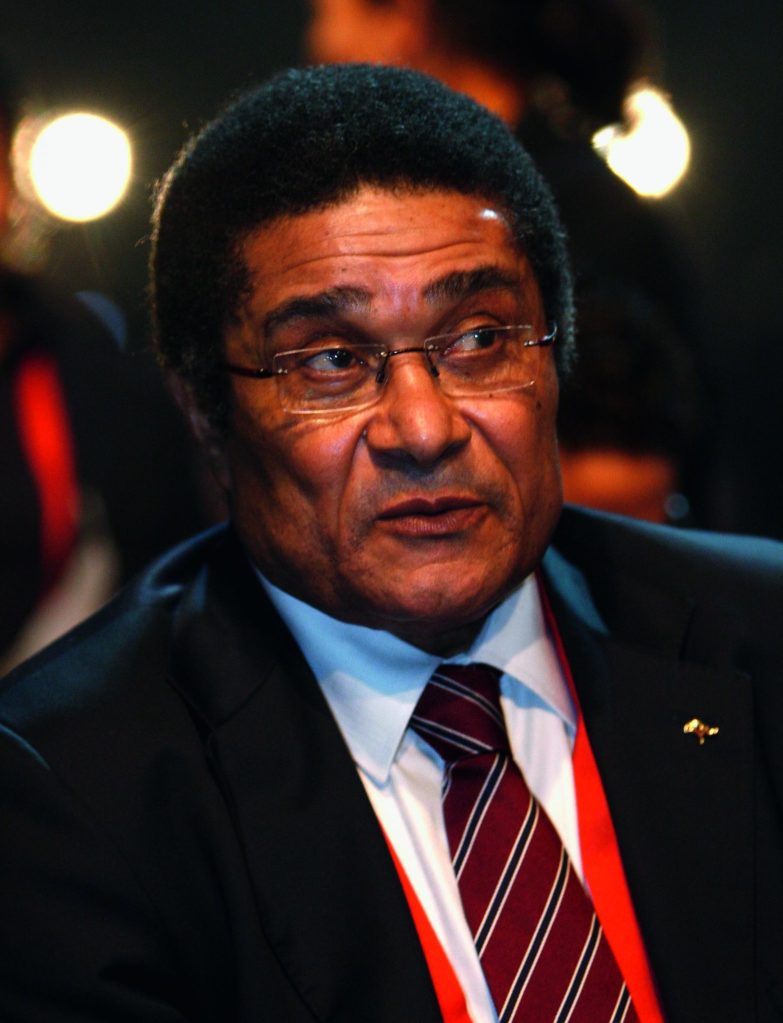The genius son of Mafalala has gone; the fast and deft feet that learned the game on the rugged streets of Maputo, in Mozambique, have been laid to rest. They called him the Black Panther and the Black Pearl; whatever they called him, he left defenders speechless in his wake.

On the streets of Mafalala, as rough as a flying tackle, Eusébio learned the football that was to take him from poverty to stardom with a ball made out of newspaper wrapped with rags. Mafalala was a tough training ground of cuts, bruises, grit and stones; where, to this day, barefoot youngsters trap and pass. I have stood on that makeshift, sandy pitch in the twilight of another warm Maputo day, listening to the shouts of the young and hopeful. If you close your eyes, you can see the young Eusébio and Mario Coluna—two world class players who emerged from Mafalala—passing to each other and laughing their heads off. Maybe, I am merely a football romantic.
Eusébio’s mother’s house is a free kick’s distance away. The street that runs by it, is named after the man.
With his skill on the ball and explosive pace, Eusébio shone over football in his hometown like the sun. He signed for Sporting Clube de Lourenco Marques at 15 and soon caught the eye of scouts.
Loading...
Legend has it that a chance encounter in a barber’s shop, in Lisbon, sealed Eusébio’s chance of a glittering career. In the barber’s chair was a scout, for Brazilian team Sao Paulo, who had just returned from Mozambique where he had been bowled over by the skilful young Eusébio. Listening to the scout’s story was legendary Benfica coach, Bela Guttman, who flew straight to Mozambique and persuaded the young man to sign for around $10,000. Eusébio’s mother put the money in the bank and said she wouldn’t touch it until her son had made it as a professional. Imagine that, in this age of avaricious football agents.

There was controversy in Portugal before Eusébio kicked a ball. Sporting Clube de Lourenco Marques was a feeder club to Sporting Lisbon, who didn’t take too kindly to rival Benfica snatching a young star from under their noses. Sporting appealed Eusébio’s registration in a wrangle that lasted five months. Eusébio was cloistered by Benfica in a fishing village in the Algarve until it was all over.
Eusébio scored a hat-trick on his debut for Benfica; two weeks later, he scored a hat-trick in a friendly against Santos, which had Pele in the side, in Paris. Few, including Pele, had seen anything like him. He was a new breed of striker: fast, robust, good in the air, a master at free kicks with a fearsome shot; a forerunner of the great nimble goal scorers of the modern era like Maradona and Lionel Messi.
In an illustrious career, that exceeded all expectations, Eusébio scored 473 goals in 440 games in 15 years at Benfica. For Portugal, he played 64 times, scoring 41 goals. His finest hour was during the World Cup in England in 1966 where Eusébio scored nine goals in six games, winning the golden boot, and could very easily have won the tournament for Portugal. The 1966 Portugal side was considered the greatest ever and was captained by Coluna, the other sensation from Maputo. The Portuguese journalists christened the midfield colossus Coluna the “Sacred Monster” because he was both terrifying and beautiful.
The night before the semi-final, in which Portugal was to play England at Goodison Park in Liverpool, the English Football Association switched the game to
Wembley, in London. It meant the Portuguese traveled down from Liverpool by train, overnight, arriving sleepless and in poor shape.
Even then, Portugal lost narrowly 2-1 with Eusébio scoring the goal. You could not imagine this kind of conniving
gamesmanship in the game of today. No surprise that, in Portugal, this semi-final is known as the ‘Jogo das lagrimas’—the game of tears.
Eusébio also stamped his name on the European Cup and scored twice in a 5-3 win over Real Madrid in the final in 1962. After the match, the 19-year-old swapped shirts with his boyhood hero Ferenc Puskás.
In that game, Eusébio displayed his trademark politeness. Benfica were awarded a penalty and captain Coluna prepared to take it.
“Senor Coluna, may I take the penalty?” Eusébio asked.
The one man from Mafalala passed the ball to the other; Eusébio scored and the cup was secured.
In 1968, Benfica lost 3-1 to Manchester United at Wembley. Many remember the game for a superb solo goal by George Best; many more will remember it for the moment Eusébio stood and applauded United goalkeeper, Alex Stepney, for
saving one of his bullet shots.
That was the gentleman and sportsman Eusébio was—a humane and gentle spirit who lit up the game and did Africa proud.
In Mozambique, Eusébio was revered during his many visits, but never tempted to return home. Among some in
Mozambique there is a tinge of regret that the great man never brought his energy and skill back to the land of his birth. Coluna did; when his playing days were over he came back to coach the unfashionable Text Chimoio to the national championship followed by many years of work in the
administration of the game in Mozambique. Coluna, who played nearly 700 times for Benfica and 57 times for Portugal, is retired in the quiet suburbs of Maputo, a long ball away from Mafalala where it all began.
Maybe, Eusébio gave his all to the game in the name of Africa and that was enough for one life.
Loading...
